- Home
- Elizabeth Bear
A Companion to Wolves
A Companion to Wolves Read online
The author and publisher have provided this e-book to you without Digital Rights Management software (DRM) applied so that you can enjoy reading it on your personal devices. This e-book is for your personal use only. You may not print or post this e-book, or make this e-book publicly available in any way. You may not copy, reproduce or upload this e-book, other than to read it on one of your personal devices.
Copyright infringement is against the law. If you believe the copy of this e-book you are reading infringes on the author’s copyright, please notify the publisher at: us.macmillanusa.com/piracy.
Table of Contents
Title Page
Copyright Notice
ONE
TWO
THREE
FOUR
FIVE
SIX
SEVEN
EIGHT
NINE
TEN
ELEVEN
TWELVE
THIRTEEN
FOURTEEN
Authors’ Note
The Wolfheallan, The Wolfcarls, And The Wolves
Praise for A Companion to Wolves
Copyright Page
This book is for Amanda Downum and Beth Meacham.
ONE
Njall could not stop looking at the wolf.
She lay on the flags before the fire in his father’s hall at Nithogsfjoll and panted, despite the chill. Njall was sixteen, almost a man, even if he was hoping for just one more spurt of growth, but her head was as broad as the span of his palm between her eyes. His arms couldn’t have circled her barrel, and if she rose on her long racer’s legs, she would—almost—be able to look him in the eye, were her attention not reserved entirely for her master.
She was big even for a trellwolf, and more, she looked tired. Her winter coat was shedding in hanks and clumps, like handfuls of dirty rags gray with scrub-water, and he could see her ribs under the skin like sprung staves. Her midsection bulged with the promise of pups, and her heavy black nipples leaked watery fluid on the stones where she lay, infinitely patient, waiting for her master to finish his business with Njall’s father.
Njall didn’t know what the business was, exactly, but he did know his father wasn’t pleased to be doing it. Njall had been exiled—not to the boys’ dormitory but to his mother’s empty solar—and fed his noon meal in isolation and bid stay like a puppy. Which he was not, and it rankled. Perhaps it was the insult that sent him, once the ale and bread and cheese and wizened last-winter apple were gone, edging down the long ragged curve of the stair to peer around the corner into the hall, stone rough under his palms, and learn what business his father had that his heir was excluded from.
And perhaps it was curiosity, too, for the men of the wolfheall almost never came to the keep. They were not welcome here, and they knew it.
The wolf had noticed him, for her ears flicked toward him now and again, but she never moved her firelight-hazel eyes from her master’s face.
Njall had seen her master before—had even seen her at his side—among the cottages that clustered around the roots of his father’s keep like goslings huddled at their mother’s feet. The wolfcarl was a big man, almost as tall and stocky as a troll himself, wild-bearded, his graying red hair braided back from his temples; the edge of the axe he carried was bright with nicks and sharpening. He was Hrolleif, the Old Wolf, high-ranked in the werthreat, and Njall knew the villagers—and the manor—owed him obedience and fear.
Obedience, for he and the trellwolves and the werthreat were all that stood between the village and the trolls and wyverns of the North. And fear, for he was of the Wolfmaegth, the Wolf-brethren, and not quite human anymore. The more so because he had bonded a bitch, a Queen-wolf, with all that that implied.
Njall had heard stories about the werthreat and the trellwolves all his life; when he was a little boy, his nurse had threatened him that if he wasn’t good, his father would tithe him to the wolfheall. Everyone knew the men of the wolfheall were half-wolf themselves, dark and violent in their passions, that they drank the blood of their fallen enemies and nursed from the teats of their she-wolves. No decent man, said Njall’s father, wanted anything to do with them.
Njall didn’t want anything to do with Hrolleif. He just wanted to look at the wolf.
His father’s voice rang across the hall: “And I’m telling you there are no boys of an age to give to your tithe. You won’t take them little but you don’t want them once they’ve come to be men, either. We do not have that many children, wolfheofodman, and I cannot conjure them out of the fire for your asking.”
“I thought your eldest son was of an age, Lord Gunnarr.”
“My son is not for the tithe!”
Njall flinched back at the vehemence in his father’s voice, and the wolf’s head turned. For a dizzying moment her eyes caught him, pinned him like a spear through the gut, firelight and autumn leaves and a clarity he’d never seen in a dog’s eyes, and then she looked back to her master, and Hrolleif laughed.
“Come out, then, pup! Let us see this boy who is not for the tithe.”
Njall heard his father curse, and if it had just been Hrolleif he wouldn’t have moved. Obedience was owed to his father, as jarl and as sire.
But the wolf had looked at him.
Njall came the rest of the way down the stairs, not looking at his father. Not looking at Hrolleif. He kept his eyes fixed on the trellwolf, and although she did not look at him again, her ears monitored his movements.
“So,” said Hrolleif, and Njall had to look at him now, tilting his head to meet the Old Wolf’s eyes. “My sister says you might be fit to join our threat, youngling. What think you?”
Sister? Njall was bewildered; the only people in the arched and gloomy hall were his father, Hrolleif, and himself, and why would the wolfheofodman be taking a woman’s advice? But then the wolf turned her massive head to give him another look, this merely in passing, not the breath-stealing blow of before, and he knew that Hrolleif had meant her. His sister.
He gulped and said, “I do not know, Lord Hrolleif.”
“An honest answer, at least. I do like a boy who doesn’t swagger.” Hrolleif stepped forward, swiftly and with such power that it took a conscious effort for Njall to hold his ground. He caught Njall’s jaw in one broad hand, turning his face toward the firelight. Peeling calluses scratched Njall’s face. “Handsome lad. He takes after your lady wife, I see.”
“Damn you, Hrolleif—”
“Lord Gunnarr.” All the easy amusement was gone from Hrolleif’s voice, although his fingers stayed gentle against Njall’s face. “You know the laws. You owe the wolfheall tithe, and as you yourself have said, there are not many lads of the right age in manor or village. We cannot farm when we are fighting, and if we are not fighting, you are jarl of—” His free hand rose in an expansive gesture “—nothing.”
“Thorkell Blacksmith’s son,” Njall’s father said, and Njall was embarrassed at the note of pleading in his voice.
“Is simpleminded,” Hrolleif said flatly. “As this one is not. What’s your name, pup?”
“Njall, Lord Hrolleif.”
“Njall. You will fulfill your house’s duty to the wolfheall, will you not?”
Fear blocked Njall’s throat. Wolfheall. There were stories—he turned away, pulling against Hrolleif’s grip, so he would not have to look into the wolfheofodman’s eyes or at his father’s rage. He owed a duty to his father. To the village and the manor. He was the jarl’s son, raised to be heir. There was a girl, Alfleda, whom he’d half-promised to take as a paramour once he was married, and there was a betrothal to a jarl’s daughter he’d never met, and there was his father’s gaze, resting on him now with an iron weight.
And there
were the stories of what the men of the wolfheall did with each other, with the boys who went in tithe.
But as he turned, the trellwolf lifted her head again and caught him with a gaze of such piercing, knowing sweetness that he swallowed the fear.
He couldn’t stop looking at the wolf.
And he owed a duty to the wolfheall, too.
Because Hrolleif was right; if the wolfheall did not fight, there would be nothing left worth fighting for.
“Yes, Lord Hrolleif,” Njall said, and his father the jarl turned away and slammed his fist against one of the great supporting beams.
“All is not lost, Gunnarr,” Hrolleif said, releasing Njall and turning to go, his wolf—his sister—coming slowly to her feet to follow him. “He may not be chosen. It is a spring litter, after all, and spring litters are small.” He paused, and traded a glance with the wolf. “Send him with the wagon tomorrow, when you deliver the rest of the tithe. I’ll not take a boy from his mother without a kiss.”
Njall swallowed again as the door closed behind Hrolleif. At another time he might have protested the implication that he was still a child, still tied to the woman’s world of kitchen and solar. But now, his hands shook and his knees trembled. The more so when his father, staring at the banded door, did not raise his voice at all but only said, gently, as if to a woman, “Njall.”
“Father?”
“I cannot stop you. You’ve sixteen summers, and were you not to be jarl after me, you’d be a year or three ’prenticed. But think a moment. What if that wench of yours is with child? What of your mother, and your sister, too? If I were lost on the hunt or the field, who would care for them and keep the town strong?”
“Father—” Njall said. His hands clenched in the fabric of his trews. He shook his head, but Gunnarr stayed him with a hand before he could answer, whatever he might have said.
“Think about it,” Gunnarr said. “Before you sell yourself to be some … unclanned bastard’s catamite. Or worse.” He shook his head, and turned to stare Njall in the face. “Go to the dormitory, son. You have until morning to change your mind.”
Of course Njall couldn’t stay there. At this hour of the day the older boys were all at weapons-practice—as Njall should have been if his father had not chosen to try to hide him away like the child he wasn’t—and the younger boys were giggling over some elaborate game among themselves. There was neither comfort nor counsel to be looked for from that quarter. He found himself shivering with delayed reaction, rubbing his hands across his face and then sniffing the fingers as if the smell of Hrolleif’s wolf could have somehow transferred from skin to skin. He paced, and threw himself on the bed, and rose to pace again. He sent one of the younger boys to look for Alfleda, but the child returned to say that she had left the keep, and had said to tell Njall that she could not be found.
So was a woman’s opinion made plain.
Eventually, inevitably, Njall’s pacing led him out of the dormitory, across the courtyard, and up the stair toward his mother’s solar. Perhaps he was not thinking clearly, but he had heard what Hrolleif had said—tomorrow, with the rest of the tithe—and, even be it womanish and weak, childish, he did not wish to leave without bidding his mother farewell.
Chosen by a wolf, he thought, and felt again the brush of the trellwolf’s amber eyes.
He was halfway up the stairs when he realized that he had seen not a single servant or waiting woman—as if they had all vanished or been sent away—and that the keep, rather than bustling with dinner preparations, was silent as moonset. Hiding from Gunnarr’s temper, no doubt; it could be formidable when there was cause. Njall knew the back of his father’s hand well enough, although never without reason.
He had hoped that, when his own time came to inherit, he would make such a lord, so just and so strong.
Raised voices paused Njall’s footsteps in the antechamber to his mother’s domain. He pressed back against a tapestry, breath short, because one of the voices was his father’s.
“We must send him away, Halfrid. Send him to the monks at Hergilsberg, away from Nithogsfjoll. Better a monk than a beast.”
“Gunnarr.” His mother’s voice, smooth and level. Njall could picture her, tall and stalwart in her white kirtle and indigo surcote, her hips broad with childbearing and the corners of her eyes crinkled with smiles. It hurt to think of her, of how she smelled of barley-and-mint-water, of her fingers quick with a needle and a silver thimble. “You cannot send him away.”
“I’ll tell the wolfheofodman he ran.”
“And when the wolf-bitch cannot find his trail over new snow? The wolfheall will not protect us if we do not tithe, my husband. As is only just. It is the law. Besides, I do not think you will convince him to flee. He knows his own honor.” Gentle, implacable, and Njall felt something uncomfortable twist in his belly.
Perhaps sometimes it was wise to listen to a woman. Not that he would have to learn, unless he wasn’t chosen. Wolfcarls did not marry. But for a woman’s voice to speak reason when a man’s counseled cowardice—there was shame.
“Damn you, Halfrid.” But surrender filled Gunnarr’s voice, although his next words fell cold as stones. “You know what they do to those boys.”
Njall heard footsteps, his father’s footsteps; he slid between the tapestry and the wall, holding his breath.
“You must warn him,” she said.
The footsteps stopped shy of the door. The stone was dank against Njall’s back. The tapestry smelled of cedar and smoke and mildew. “Warn him that they’ll make a wolf-bitch of him? Warn him that I am handing him over to be some beast’s nithling and toy? Warn him of what he already knows?”
“Hrolleif does not seem less than a man to me,” Halfrid said, after a hesitation.
Njall’s father snorted harsh laughter through his beard; the sound was almost a sob. Njall drove his nails into his palms, willing himself silent and still.
“Perhaps—” The sweep of her skirt across rushes. She sighed, and there was a rustle of cloth. Njall imagined she drew his father into her embrace. “Perhaps he will not be chosen. Perhaps he will be chosen by a male, and he will lead the werthreat someday himself. Perhaps he will grow to be a powerful ally to you, my lord. Your son, a wolfheofodman—”
“Perhaps is a cold word, Halfrid,” Njall’s father said, and then there was only silence through the doorway, until Njall slipped away.
The other older boys had returned to the dormitory, Njall’s brother Jonak included, but he found he could not face them and walked out into the cold dusk instead. He crossed the courtyard once more to seek solace in the stable. His old pony Stout had been given to his sister Kathlin when he grew strong enough to handle a man’s steed, but the little mare was still a friend, her shaggy wire-harsh gray mane drifting over gentle eyes. He leaned against the bar of the box she shared with two other ponies and let her drape her neck over his shoulder, steaming breath snuffing his cheek.
Kathlin found him there. She was a slip, an alf-seeming thing with the promise of their mother’s looks, and all their father’s temper. He wasn’t surprised when she strode across the packed earth floor, stared at him for a moment, her chin lifted defiantly, and kicked him hard in the shin.
She got her hip into it. “Ow!” he protested, and was about to grab her and pick her up off her feet when she lunged forward, dissolving into sobs with the immediacy of a child. “Kathlin,” he said, hopelessly. She cried harder, thumping his chest with both hands doubled up around the leather jerkin.
“You’re leaving,” she accused between sobs. “Father says you won’t come back and I’m not to visit you. And Alfleda said she won’t ever come back—”
“Did he say I was forbidden?” Njall asked, stroking her shoulders. She shook her head, her face pressed into his shirt. The tears soaked the cloth so cold bit through. Stout nickered and nosed Kathlin’s hair, which made her laugh, and sniffle, finally, although she didn’t step back.
“Don’t go.”
He hugged her tight. She was warm, but shivering. Her bones were too big for her flesh—she was growing, and felt stretched out over them. “I have to.” He brightened, though. “I’ll come visit you. When I can. If they let me.”
“Won’t they let you?” She stepped back, smoothing her dress, self-conscious enough to give him her shoulder. Younger than he by summers, but suddenly like a woman grown. “They can’t keep you locked up, can they? I mean, wolfcarls aren’t supposed to have families. You can’t marry, you can’t … It’s in all the songs. You’re just going to fight the trolls until you die.”
“They may not even take me,” he said, and reached out to grab her shoulders. “Come on, Kathlin,” he said, when he felt that she was shivering still. “Come inside before Nurse finds you missing, or you freeze. They probably won’t take me. And if they don’t, I’ll be home by harvest, and our debt to the wolfheall will be paid.”
She glanced at him under her lashes, her eyes startlingly blue. “Promise?”
“Promise,” he said, and squeezed her tight before he hurried her inside.
He slept little and uneasily, rising well before dawn to wash and dress. His father had not sought him out, neither to tell him he was being sent to Hergilsberg—and Njall knew, with some surprise, that his mother was right: if his father had proposed that plan, he would have refused—nor to speak with him plainly, as man to man, about the customs of the wolfheall. Njall was not sure if he was glad or sorry, as he was not sure if he was glad or sorry that his father had not come to bid him farewell. The one thing he did know was that he would not have his house’s duty to the wolfheall unfulfilled through his cowardice. No matter what they did to him, it would be better than knowing himself craven.
The tithe-wagon was in the courtyard, thralls loading it with sacks of turnips, barrels of salted herring. Halfrid stood beside the great, patient horses, stroking their noses while the tired-eyed wagoner swallowed the last of a hasty breakfast.

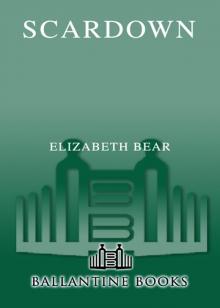 Scardown
Scardown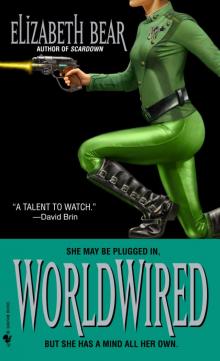 Worldwired
Worldwired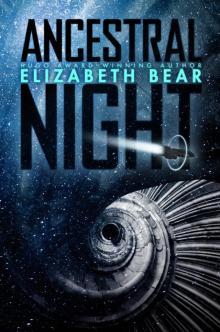 Ancestral Night
Ancestral Night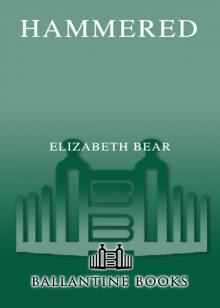 Hammered
Hammered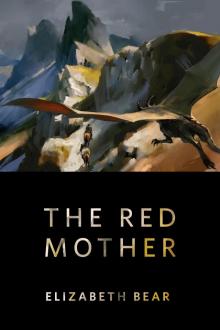 The Red Mother
The Red Mother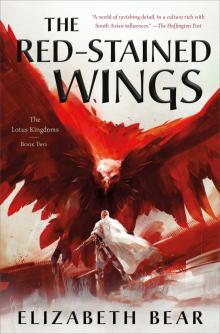 The Red-Stained Wings--The Lotus Kingdoms, Book Two
The Red-Stained Wings--The Lotus Kingdoms, Book Two Machine
Machine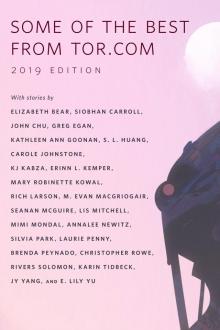 Some of the Best from Tor.com: 2019 Edition
Some of the Best from Tor.com: 2019 Edition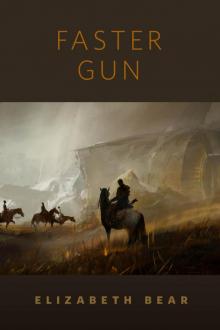 Faster Gun
Faster Gun In the House of Aryaman, a Lonely Signal Burns
In the House of Aryaman, a Lonely Signal Burns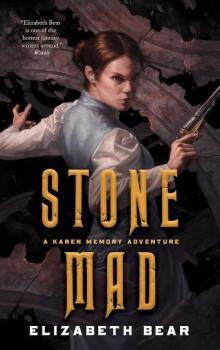 Stone Mad
Stone Mad Robots: The Recent A.I.
Robots: The Recent A.I.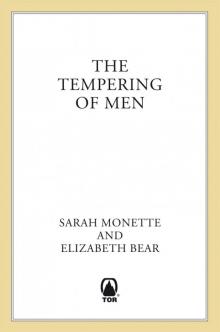 The Tempering of Men
The Tempering of Men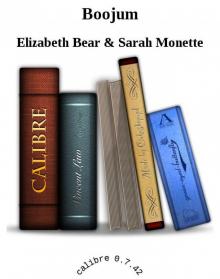 Boojum
Boojum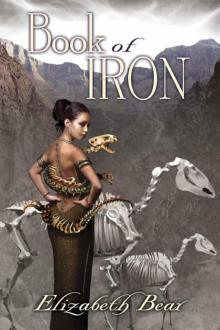 Book of Iron bajc-2
Book of Iron bajc-2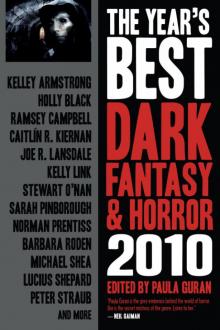 The Year's Best Dark Fantasy and Horror, 2010
The Year's Best Dark Fantasy and Horror, 2010 New Cthulhu 2: More Recent Weird
New Cthulhu 2: More Recent Weird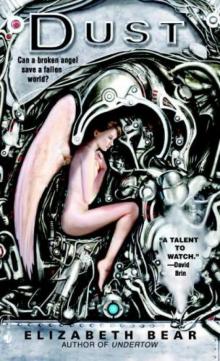 Dust jl-1
Dust jl-1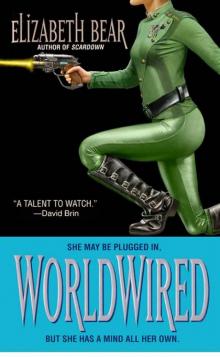 Worldwired jc-3
Worldwired jc-3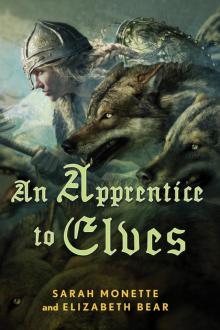 An Apprentice to Elves
An Apprentice to Elves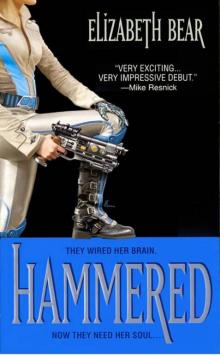 Hammered jc-1
Hammered jc-1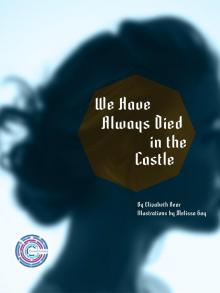 Crowd Futures: We Have Always Died in the Castle
Crowd Futures: We Have Always Died in the Castle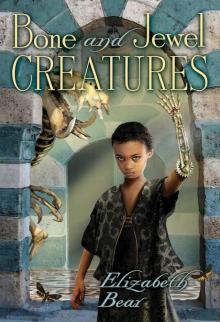 Bone and Jewel Creatures bajc-1
Bone and Jewel Creatures bajc-1 Carnival
Carnival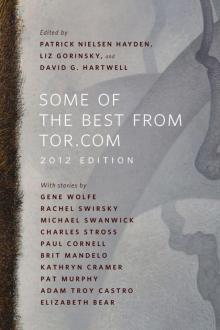 Some of the Best from Tor.com: 2012 Edition: A Tor.Com Original
Some of the Best from Tor.com: 2012 Edition: A Tor.Com Original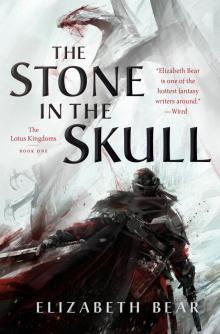 The Stone in the Skull
The Stone in the Skull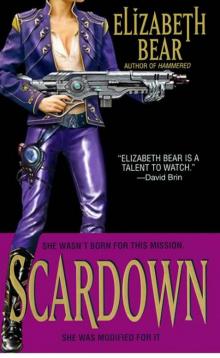 Scardown jc-2
Scardown jc-2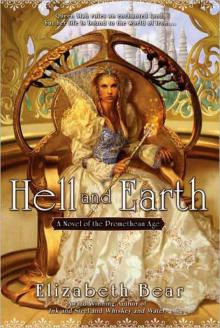 Hell and Earth pa-4
Hell and Earth pa-4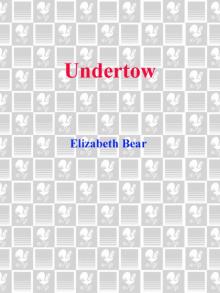 Undertow
Undertow Mermaids and Other Mysteries of the Deep
Mermaids and Other Mysteries of the Deep A Companion to Wolves
A Companion to Wolves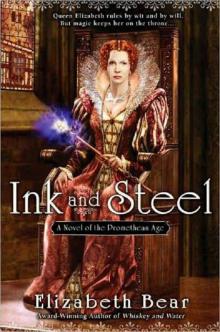 Ink and Steel pa-3
Ink and Steel pa-3